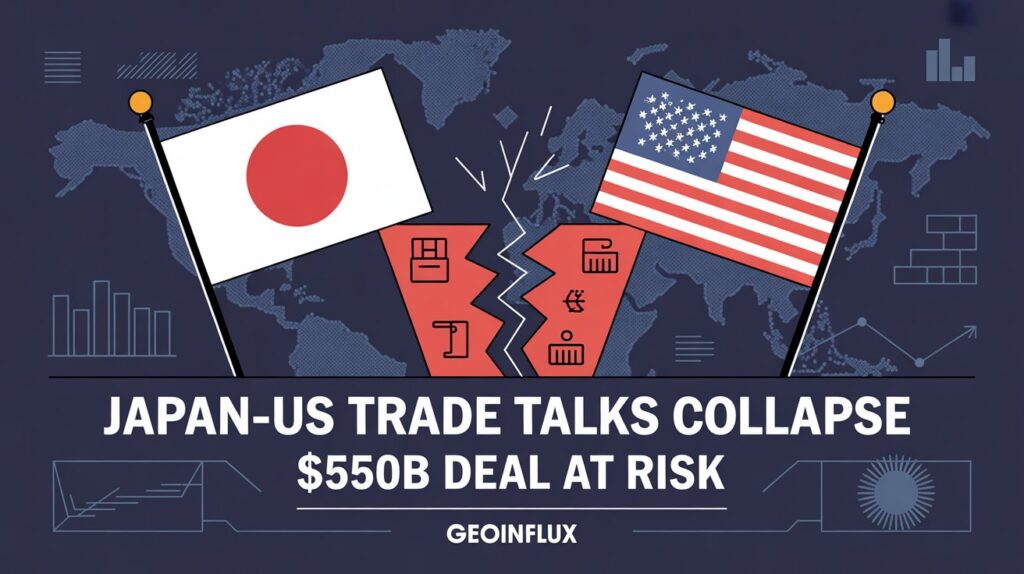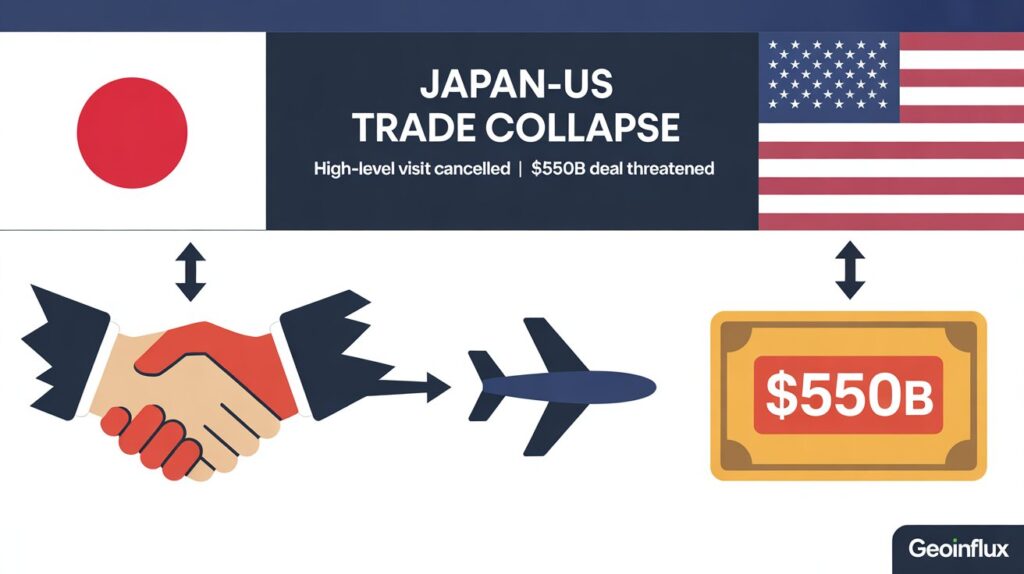Japan US trade talks collapse as Tokyo cancels negotiator Ryosei Akazawa’s visit, stalling $550 billion investment, raising tariff disputes, and testing Trump tariff policy. Explore the fallout, key reasons, and global impact.
Japan US Trade Talks Collapse as Japan Cancels High-Level U.S. Visit, $550 Billion Deal at Risk
Introduction
The Japan US trade talks have hit a dramatic setback after Japan’s chief negotiator, Ryosei Akazawa, abruptly cancelled a high-level visit to Washington.
The trip was supposed to finalise a landmark bilateral trade and investment agreement, but Tokyo’s sudden decision has left a $550 billion investment deal in limbo.

The cancellation highlights deep disagreements over reciprocal tariffs, delayed refund mechanisms, and the broader unpredictability of the Trump tariff policy.
Background of Japan US Trade Talks
- In July, both sides agreed to a 15% tariff ceiling on Japanese imports, scaled down from a proposed 25%, setting a benchmark for other trade partners.
- A major feature of the deal involved Japan’s pledge of a $550 billion U.S. investment package, though disputes remain over profit-sharing, with Washington expected to retain nearly 90%.
- Frustration grew when Japanese negotiators discovered a hidden 15% surcharge, effectively raising duties beyond the agreed cap. Many in Tokyo view this as a symptom of the Trump tariff policy, which critics say prioritises pressure over predictability.
Current Developments
- Chief Cabinet Secretary Yoshimasa Hayashi confirmed that high-level negotiations are suspended, with technical discussions moving to the working level.
- Japan has urged the U.S. to revise executive orders governing tariffs, particularly in the auto and vehicle components sector, where Japanese exports are most vulnerable.
- Tokyo is also pressing Washington for clarity on tariff refund timelines, a sticking point that risks eroding trust further.

Impact of Japan US Trade Talks Collapse on the Global Economy
- The cancellation reverberates globally, with the EU, China, South Korea, Vietnam, and Taiwan all watching closely as they navigate their own talks with Washington.
- Analysts warn that if Japan US trade talks collapse permanently, it could spark a broader export market shift, undermining America’s credibility as a stable trade partner.
- Other allies may be emboldened to resist or delay finalising deals shaped by the Trump tariff policy.
Strategic Implications for Japan and the US
Japan’s decision to pull back signals three key shifts:
- Rising political risk in entering opaque trade agreements designed under the Trump tariff policy.
- Growing pushback against profit-sharing frameworks skewed toward U.S. interests.
- The possibility of a pivot toward Asian trade alliances, reducing reliance on Washington.
Ultimately, the trade agreement cancellation underscores the fragility of global commerce in an era where trust and enforceability matter as much as tariffs and investments.
Conclusion
The cancelled visit is more than a diplomatic manoeuvre — it represents a crisis of confidence in the Japan US trade talks. With unresolved issues around reciprocal tariffs, refund delays, and a contested $550 billion investment, the U.S.–Japan economic partnership faces its toughest test in years.
Whether the deal revives or collapses may define not only bilateral relations but also how other nations engage with Washington under the Trump tariff policy.
Recap Table
| Key Issue | Details | Impact |
|---|---|---|
| Tariffs | 15% cap agreed, but hidden surcharges surfaced | Trust deficit in U.S. commitments |
| Investment | $550 billion package, 90% profit share to the U.S. | Seen as unfair by Tokyo |
| Refunds | Unclear refund timelines | Risk of wider global pushback |
| Global Signal | Japan cancels visit | Allies may resist U.S. trade deals |
FAQs
1. Why did Japan cancel its U.S. trade negotiator’s visit?
Japan cancelled the visit because of unresolved disputes in the Japan US trade talks. Tokyo objected to unexpected reciprocal tariffs that went beyond the agreed 15% cap and raised concerns about delayed tariff refund mechanisms. Another sticking point was the profit-sharing imbalance in the proposed $550 billion investment, where the U.S. would retain up to 90% of profits. By cancelling the visit, Japan signalled that it would not proceed without revisions and guarantees. Analysts believe the move also serves as a warning to other countries negotiating under similar conditions shaped by the Trump tariff policy.
2. What was included in the $550 billion Japan–US trade deal?
The proposed deal revolved around Japan’s commitment to a $550 billion investment in the U.S., aimed at boosting American industries, especially energy and infrastructure. In exchange, Washington agreed to cap tariffs on Japanese imports at 15%. However, disputes quickly emerged over how profits from this investment would be shared, with the U.S. set to claim nearly 90% of returns. This imbalance, coupled with unclear refund processes, has fueled mistrust. Critics argue that such terms reflect the leverage-heavy style of the Trump tariff policy, making the deal controversial from the start.
3. How does this affect global trade partners?
The collapse of the Japan US trade talks has a ripple effect on other nations currently in negotiations with Washington, including the EU, China, South Korea, Vietnam, and Taiwan. These countries may interpret Japan’s cancellation as proof that the U.S. approach lacks stability. It may embolden them to seek more favourable terms or delay commitments until Washington provides clearer rules. Since the deal was seen as a potential model for global trade, its suspension undermines U.S. credibility. Analysts note that confidence in U.S.-led trade frameworks is already fragile due to uncertainty around the Trump tariff policy.
4. What sectors are most affected by the tariff dispute?
The auto and vehicle tariffs are the most contentious issue in the Japan–U.S. negotiations. Japanese cars and components form one of the largest export categories to the U.S., making them highly sensitive to tariff increases. While a 15% cap was agreed, the discovery of an additional surcharge has left Tokyo concerned about hidden costs. Other sectors, including electronics and precision manufacturing, could also face indirect impacts if tariffs spread. Japan fears that without clear protections, its industries will lose competitiveness, especially as competitors like South Korea and Taiwan negotiate their own deals with Washington.
5. Could this derail U.S.–Japan relations long-term?
If unresolved, the cancellation of the negotiator’s visit could cast a long shadow over U.S.–Japan relations. Beyond economics, trade has always been a pillar of the broader strategic partnership between the two nations. Persistent disputes over reciprocal tariffs, refund delays, and profit-sharing could reduce trust, pushing Japan to diversify its alliances. Some experts suggest this could accelerate Tokyo’s involvement in Asian trade alliances, such as RCEP or CPTPP, as a counterbalance. While both nations have an interest in maintaining cooperation, the fragility of the current talks illustrates how easily disputes under the Trump tariff policy can strain alliances.
Related Articles on GeoInflux
- India US Trade War Trump Tariffs Surge to 50% in 2025 – Strategic Fallout & Analysis
- EU–US Trade Deal: Tariffs, Investment, and the WTO Fallout
- India–Russia Trade in a Sanctioned World: 5 Strategic Energy Deals Redefining Ties
References
- AP News – Japan U.S. tariffs dispute
- Nippon.com – Japan’s Akazawa cancels visit
- MarketScreener – Japan cancels U.S. trip
- Times of India – Tariff clarity deal
- Supply Chain Connect – U.S.–Japan deal terms
- JDSupra – International trade disputes
- The Hill – Japan postpones Washington trip
- Reuters – Reactions to U.S.–Japan deal





WONDERFUL Post.thanks for share..extra wait .. …